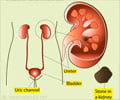Frequently Asked Questions
1. Which doctor should be consulted for ureteroscopy procedure?Consult Urologist for the procedure
2. Who is an ideal candidate for ureteroscopy?
Ureteroscopy has a high success rate for lower and mid ureter stones that do not pass out spontaneously or where medical management has failed.
Stones over 5 mm in the ureter have only a 50% chances of spontaneous expulsion and will generally require ureteroscopy procedure.
Does size of stones have any correlation to the symptoms or obstruction -
- It has been found out that even small stones can cause troublesome symptoms. Usually stones smaller than 4 mm have a tendency to pass out spontaneously however stones as small as 2 mm have caused symptoms.
3. What are the reasons for having an ureteroscopy?
If there is persistent intermittent colic or an obstructed system especially with fever, ureteroscopy is advised for removal of the stone or obstruction.
4. What reduces the risk of stones in the future?
Good hydration is the key to preventing stone formation. Diet plays a smaller role in prevention. Making the urine alkaline by taking potassium citrate solution or tablets is advised for many types of stones to lower the risk of recurrence.
It depends on the location of the stone in the ureter.
- For stones in the lower ureter – 96% to 98% success
- For stones in the mid-ureter – 90% to 95% success
- For stones in the upper ureter – 70 to 80 success
Sometimes to remove the smaller stones after fragmentation or for removing a small stone the basket or a grasper is used.
7. What are the cases where ureteroscopy may not be a good option?
For a large hard stones in the ureter that are over 2.5 to 3 cms , other methods of stone removal maybe better like laparoscopy.
A stone lodged in the upper ureter or just below the pelvi-ureteric junction may fly back into the kidney, hence a flexible ureteroscopy maybe a better option.










